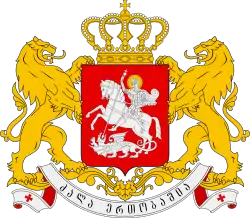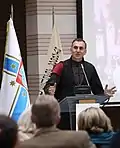2017 Georgian local elections
The Georgian local self-government election, 2017 (Georgian: საქართველოს ადგილობრივი თვითმმართველობის ორგანოების არჩევნები) was held on 21 October 2017[1] to elect the bodies of local government of Georgia: 2,058 members of representative councils (sakrebulo) and 64 mayors of municipalities. The ruling Georgian Dream party won in all constituencies under the proportional contest and secured 63 out of 64 mayoral positions. The votes went into second-round runoffs in six municipalities, scheduled for 12 November 2017.[2]
| |||||||||||||||||||||||||||||||||||||
| |||||||||||||||||||||||||||||||||||||
 |
|---|
| This article is part of a series on the politics and government of Georgia |
|
|
Background
There are two types of municipalities in Georgia: self-governing cities and self-governing communities. The representative councils (sakrebulo) and executive heads of municipalities – mayors are directly elected by the citizens of Georgia to a four-year term. The election date was appointed by the President of Georgia 60 days prior to the polls and countersigned by the Prime Minister.[3]
The previous elections were held in two rounds in 2014. Most of the sakrebulo (council) and gamgebeli (mayoral) seats were won by the ruling Georgian Dream coalition.[4]
Election campaign
The local non-governmental organizations monitoring the elections—the International Society for Fair Elections and Democracy (ISFED), the Georgian Young Lawyers Association (GYLA) and the Transparency International Georgia—jointly assessed the pre-election environment as mostly peaceful and noted that, while political parties were noticeably active, "the ruling party's dominance was evident".[5] The most serious incident in the pre-election campaign occurred in the village of Kizilajlo of Marneuli Municipality in which the Georgian Dream's candidate and other persons were assaulted with a firearm at the party office on October 19.[5]
In the 2017 Elections, the first ever openly-gay candidate ran for public office in Georgia. Nino Bolkvadze from the Republic Party, was aimed to take her place in the capital of Georgia. "Bolkvadze, who is running for the Republican Party, a small opposition force, said she hoped her campaign would put the spotlight on gay rights and change outdated public perceptions of LGBT people." [6]
Tbilisi mayoral election, 2017
| |||||||||||||||||||||||||||||||||||||||||||||||||||||||||
| |||||||||||||||||||||||||||||||||||||||||||||||||||||||||
The Tbilisi mayoral election, 2017, (Georgian: თბილისის მერის არჩევნები) was held on 21 October 2017 to elect the Mayor of Tbilisi. Also Tbilisi City Concuil elections were held.
The main candidates for the mayoral election were Kakha Kaladze, former footballer and minister of energy from ruling Georgian Dream coalition, journalist Zaal Udumashvili from UNM, Tbilisi City Council member and journalist, Aleko Elisashvili, independent candidate, member of parliament Elene Khoshtaria from European Georgia and journalist, member of parliament Irma Inashvili, leader of Alliance of Patriots of Georgia
Opinion polls
| Pollster | Date | Kaladze GD |
Udumashvili UNM |
Elisashvili Independent |
Khoshtaria EG |
|---|---|---|---|---|---|
| Edison Research | 22.09.17 —02.10.17 | 34% | 14% | 14% | 5% |
| Metronome | 23.08.17 —15.10.17 | 33% | 13% | 29% | 14% |
| Forum.ge | 03.08.17 —27.09.17 | 12.67% | 11.28% | 64.76% | 3.86% |
| NDI | 18.06.17 —09.07.17 | 37% | 16% | 22% | 5% |
References
- "Municipal Election Date Set for October 21". Civil Georgia. 22 August 2017. Retrieved 26 August 2017.
- "CEC Releases Final Municipal Election Results". Civil Georgia. 2 November 2017. Retrieved 5 November 2017.
- "ადგილობრივი თვითმმართველობის კოდექსი [Code of Local Self-Government]". Organic law No. 1958-IIს of 5 February 2014 (in Georgian). Retrieved 19 June 2017.
- "Georgia Local Elections June 15 and July 12, 2014" (PDF). International Republican Institute. 2014. p. 2. Retrieved 19 June 2017.
- "Elections 2017: Weekly Digest No. 7". Civil Georgia. 3 November 2017. Retrieved 5 November 2017.
- "Elections 2017: Georgia's first openly gay politician tests homophobia in Caucasus".





.jpg.webp)



